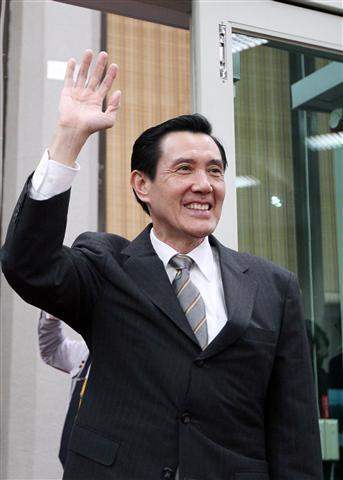News & activities
 News releases
News releases
2012-04-07
President Ma leads delegation on visit to African allies
President Ma Ying-jeou set off on the evening of April 7 with a delegation to visit three of the ROC's diplomatic allies in Africa—Burkina Faso, Republic of The Gambia, and Kingdom of Swaziland. The president delivered a short statement prior to boarding the plane, expressing his hopes that this trip will further solidify the alliances that the ROC maintains with its African friends, and that it will strengthen mutual friendship.
In remarks, the president stated that this is not only his first trip to Africa as president, but also marks the first time that he has ever visited the continent. The president said that this journey has been codenamed "Project Benevolence and Friendship," and explained that the ROC and the three countries he will be visiting have been longstanding allies. The ROC has long-term assistance projects there in the fields of agriculture, medicine and healthcare, and solar power in order to share Taiwan's development experience. In addition, he stated that the ROC's friends in Africa have spoken on behalf of Taiwan in many international venues and during this trip he intends to express the gratitude of the government and people of the ROC for this.
President Ma stated that the government has placed great importance on relations with mainland China and with the international community. Improvement in the cross-strait relationship is aimed at "eliminating conflict through reconciliation, and switching from confrontation to negotiation." This, he said, is helping to gradually reduce tensions in the region, while also expanding room for the ROC in the international community. The president said that relations with the ROC's 23 diplomatic allies are stable, and that the government will continue to improve the nation's ties to countries with which we do not have diplomatic relations.
President Ma stressed that the government has long embraced the principle of "seeking proper goals, acting lawfully, and exercising effective administration" in the conduct of foreign aid policy, thereby enabling alliances between the ROC and its friends to continue to move forward in a stable manner. He added that the government's adoption of the "viable diplomacy" policy has yielded concrete results, with a total of 127 countries and areas now providing visa-free courtesies or landing visas to ROC nationals. This demonstrates that the two sides of the Taiwan Strait no longer have to waste resources in the international community in a bid to win friends, but rather can use these resources to assist countries in need, he added.
The president is slated to return to Taiwan on April 18. High-ranking officials including Vice President Vincent C. Siew, Vice President-elect Wu Den-yih (吳敦義), Legislative Yuan President Wang Jin-pyng (王金平), Secretary-General to the President Tseng Yung-chuan (曾永權), National Security Council Deputy Secretary-General Ko Kuang-yueh (葛光越), and Deputy Minister of Foreign Affairs Tung Kuoyu (董國猷), along with ambassadors to the ROC from Burkina Faso, Republic of The Gambia, and the Kingdom of Swaziland were on hand at the airport to wish the president a safe and successful journey.
In remarks, the president stated that this is not only his first trip to Africa as president, but also marks the first time that he has ever visited the continent. The president said that this journey has been codenamed "Project Benevolence and Friendship," and explained that the ROC and the three countries he will be visiting have been longstanding allies. The ROC has long-term assistance projects there in the fields of agriculture, medicine and healthcare, and solar power in order to share Taiwan's development experience. In addition, he stated that the ROC's friends in Africa have spoken on behalf of Taiwan in many international venues and during this trip he intends to express the gratitude of the government and people of the ROC for this.
President Ma stated that the government has placed great importance on relations with mainland China and with the international community. Improvement in the cross-strait relationship is aimed at "eliminating conflict through reconciliation, and switching from confrontation to negotiation." This, he said, is helping to gradually reduce tensions in the region, while also expanding room for the ROC in the international community. The president said that relations with the ROC's 23 diplomatic allies are stable, and that the government will continue to improve the nation's ties to countries with which we do not have diplomatic relations.
President Ma stressed that the government has long embraced the principle of "seeking proper goals, acting lawfully, and exercising effective administration" in the conduct of foreign aid policy, thereby enabling alliances between the ROC and its friends to continue to move forward in a stable manner. He added that the government's adoption of the "viable diplomacy" policy has yielded concrete results, with a total of 127 countries and areas now providing visa-free courtesies or landing visas to ROC nationals. This demonstrates that the two sides of the Taiwan Strait no longer have to waste resources in the international community in a bid to win friends, but rather can use these resources to assist countries in need, he added.
The president is slated to return to Taiwan on April 18. High-ranking officials including Vice President Vincent C. Siew, Vice President-elect Wu Den-yih (吳敦義), Legislative Yuan President Wang Jin-pyng (王金平), Secretary-General to the President Tseng Yung-chuan (曾永權), National Security Council Deputy Secretary-General Ko Kuang-yueh (葛光越), and Deputy Minister of Foreign Affairs Tung Kuoyu (董國猷), along with ambassadors to the ROC from Burkina Faso, Republic of The Gambia, and the Kingdom of Swaziland were on hand at the airport to wish the president a safe and successful journey.



